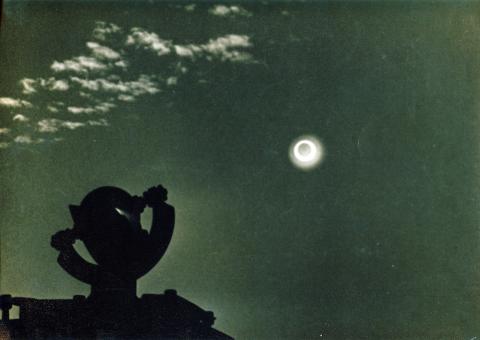Astronomy enthusiasts will be able to watch a live broadcast of an annular solar eclipse on the Web site of Central Weather Bureau, the meteorological office said yesterday.
The last time such a rare phenomenon was visible from Taiwan was on April 19, 1958.
The annular solar eclipse would not be visible again until June 21, 2020.

Photo courtesy of the Central Weather Bureau
The bureau said yesterday that the eclipse would begin in Taiwan between 6:08am and 6:10am on Monday next week and end at between 6:10am and 6:14am the same day.
The path of the annular solar eclipse will pass over residents in the northwestern part of Taiwan as well as the outlying islands of Kinmen and Matsu, who will be able to see the phenomenon clearly.
However, those living in the rest of the country will only be able to see part of the solar eclipse.
The bureau said the Dongjyu Island (東嶼) near Matsu would be the nation’s closest point to the center of the moon’s shadow. Residents of Dongjyu will be able to watch the annular eclipse for 4 minutes and 31 seconds, giving them the longest viewing window in the country.
The bureau’s observation station in Matsu also said that last time residents in Matsu saw an annular solar eclipse was on Dec. 15, 1610, when China was under the rule of the Ming Dynasty.
The station added that people in Matsu will not see the phenomenon again until Jan. 27, 2074.
Those living in Kinmen and the rest of Matsu will be able to watch the eclipse for about 4 minutes and 7 seconds and 4 minutes and 24 seconds respectively.
The bureau said the annular eclipse would last 1 minute and 37 seconds in Keelung, 1 minute and 41 seconds in Taipei, 1 minute and 38 seconds in New Taipei City (新北市), 2 minutes and 9 seconds in Taoyuan County and 1 minute 49 seconds in Hsinchu County.
Aside from the annular solar eclipse, a partial lunar eclipse will also take place on June 4, which could be seen nationwide.
The bureau said the partial lunar eclipse would begin at 6:35pm, with a missing corner first appearing on the southeast part of the moon.
The corner will gradually expand as the moon enters the earth’s shadow, and as a result about 37 percent of the moon’s surface will be covered by the Sun. The missing corner will disappear by 8:07pm and the moon will leave the earth’s shadow completely by 21:20pm.
Following the partial lunar eclipse, a transit of Venus will occur on June 6 and will be visible nationwide.
The astronomical phenomenon happens when the planet Venus passes directly between the sun and the earth.
The planetary phenomenon will occur at 6:11am, when Venus moves in from the northeast side of the sun. Observers will see a small black dot moving slowly across the sun, which will take 6 hours and 36 minutes.
The bureau said that the solar phenomenon will not occur again until Dec. 11, 2117 and advised those interested in watching the annular eclipse or Transit of Venus to watch them with special telescopes that can filter sunlight.

Taiwan is to commence mass production of the Tien Kung (天弓, “Sky Bow”) III, IV and V missiles by the second quarter of this year if the legislature approves the government’s NT$1.25 trillion (US$39.78 billion) special defense budget, an official said yesterday. Commenting on condition of anonymity, a defense official with knowledge of the matter said that the advanced systems are expected to provide crucial capabilities against ballistic and cruise missiles for the proposed “T-Dome,” an advanced, multi-layered air defense network. The Tien Kung III is an air defense missile with a maximum interception altitude of 35km. The Tien Kung IV and V

The disruption of 941 flights in and out of Taiwan due to China’s large-scale military exercises was no accident, but rather the result of a “quasi-blockade” used to simulate creating the air and sea routes needed for an amphibious landing, a military expert said. The disruptions occurred on Tuesday and lasted about 10 hours as China conducted live-fire drills in the Taiwan Strait. The Civil Aviation Administration (CAA) said the exercises affected 857 international flights and 84 domestic flights, affecting more than 100,000 travelers. Su Tzu-yun (蘇紫雲), a research fellow at the government-sponsored Institute for National Defense and Security Research, said the air

Taiwan lacks effective and cost-efficient armaments to intercept rockets, making the planned “T-Dome” interception system necessary, two experts said on Tuesday. The concerns were raised after China’s military fired two waves of rockets during live-fire drills around Taiwan on Tuesday, part of two-day exercises code-named “Justice Mission 2025.” The first wave involved 17 rockets launched at 9am from Pingtan in China’s Fujian Province, according to Lieutenant General Hsieh Jih-sheng (謝日升) of the Office of the Deputy Chief of the General Staff for Intelligence at the Ministry of National Defense. Those rockets landed 70 nautical miles (129.6km) northeast of Keelung without flying over Taiwan,

A strong continental cold air mass is to bring pollutants to Taiwan from tomorrow, the Ministry of Environment said today, as it issued an “orange” air quality alert for most of the country. All of Taiwan except for Hualien and Taitung counties is to be under an “orange” air quality alert tomorrow, indicating air quality that is unhealthy for sensitive groups. In China, areas from Shandong to Shanghai have been enveloped in haze since Saturday, the ministry said in a news release. Yesterday, hourly concentrations of PM2.5 in these areas ranged from 65 to 160 micrograms per cubic meter (mg/m³), and pollutants were